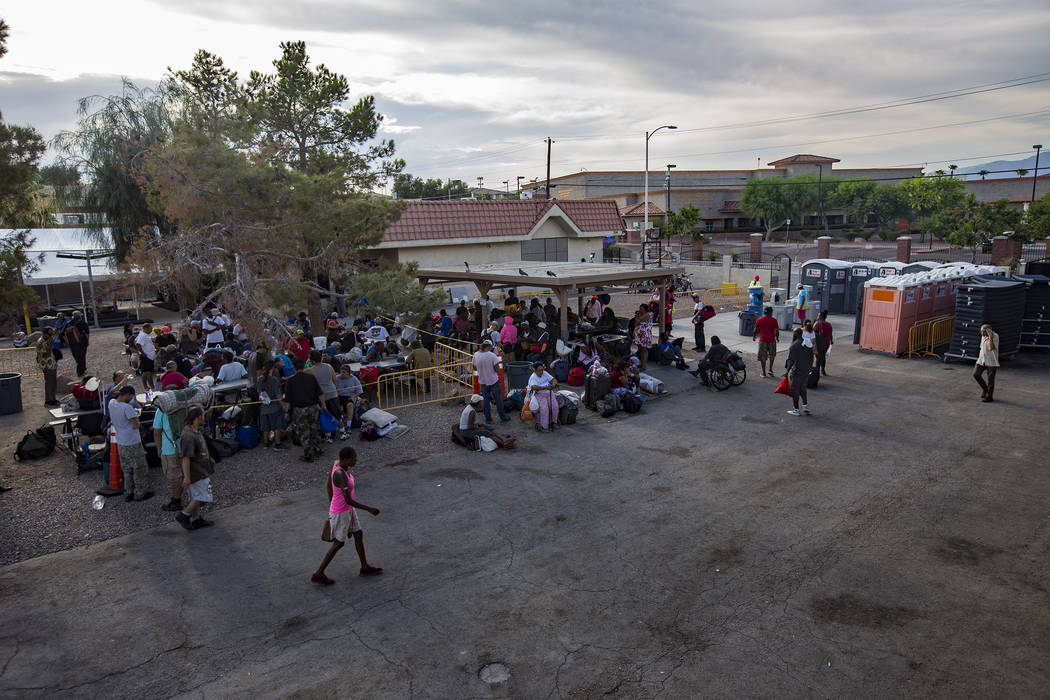Southern Nevada to spend $369M this year on homeless services
Southern Nevada is spending an average of about $26,500 for each homeless person that it interacts with, a total that is expected to reach about $369 million this year, Las Vegas City Council members were told Wednesday.
So far this year, various governmental entities in the region have spent about $234 million this year on homeless services, according to Jeremy Aguero, a consultant with Applied Analysis hired by the city’s Department of Community Service to conduct the analysis. The costs include social services, housing, policing, incarceration, medical treatment, hospitalization and cleanup of areas popular with the homeless.
And he warned that despite a decline in the number of homeless counted in the annual census this year, the cost of providing services and the demand is only increasing.
“We think the problem is likely to continue to get worse (as) our population continues to grow,” Aguero said. “Looking 20 years out, the mid-case scenario puts the annual cost of homelessness to the community at $1.1 billion per year, and the high and low estimate between half a billion and $2.2 billion.”
The report assessed the historical growth of homelessness in the county and identified causes of homelessness and current and projected future costs, as well as its possible implications.
Kathi Thomas-Gibson, director of community services, said the report to the council was prepared to brief members on the scope of the problem before the department submits an updated homeless services and affordable housing strategy for their review.
The new report highlights that Nevada ranked eighth in the nation last year among states with the highest rate of homelessness, with a rate of 24 individuals per 100,000 residents.
The state also has the highest rate of youth homeless in the nation.
A lack of affordable housing remains a concern, Aguero said, adding that the “missing middle” — households that don’t earn enough to afford market pricing but earn too much to qualify for housing subsidies — is expected to increase over the next six years.
The report highlights what the department sees as the more cost-effective way of dealing with the issue: interventions to prevent people from becoming homeless in the first place.
But that solution requires an improved system of referrals to services and more shelters and short- and long-term housing.
Mayor Carolyn Goodman said Wednesday she hopes the city’s Courtyard Homeless Resource Center, which opened 24/7 in July 2018, can serve as a model to be replicated in other parts of Clark County and elsewhere.
“But you can’t solve anything all at once,” she said. “Conversation needs to be there and open communication.”
Councilman Cedric Crear, whose ward includes downtown, where the courtyard is located and many homeless congregate, emphasized that the city cannot address the region’s problem alone.
Per state legislation this year, the county and its municipalities are forming a working group to study homelessness, identify new sources of funding and determine how cities, the county and communities can work together. The working group is expected to hold its first meeting in October.
“I hope that if there’s anyone listening, that they are willing participants, because sometimes it seems to be butting heads,” Crear said.
This article was updated to correct the source of funds used to address homeless issues as well as Jeremy Aguero’s affiliation.
Contact Briana Erickson at berickson@reviewjournal.com or 702-387-5244. Follow @ByBrianaE on Twitter.























